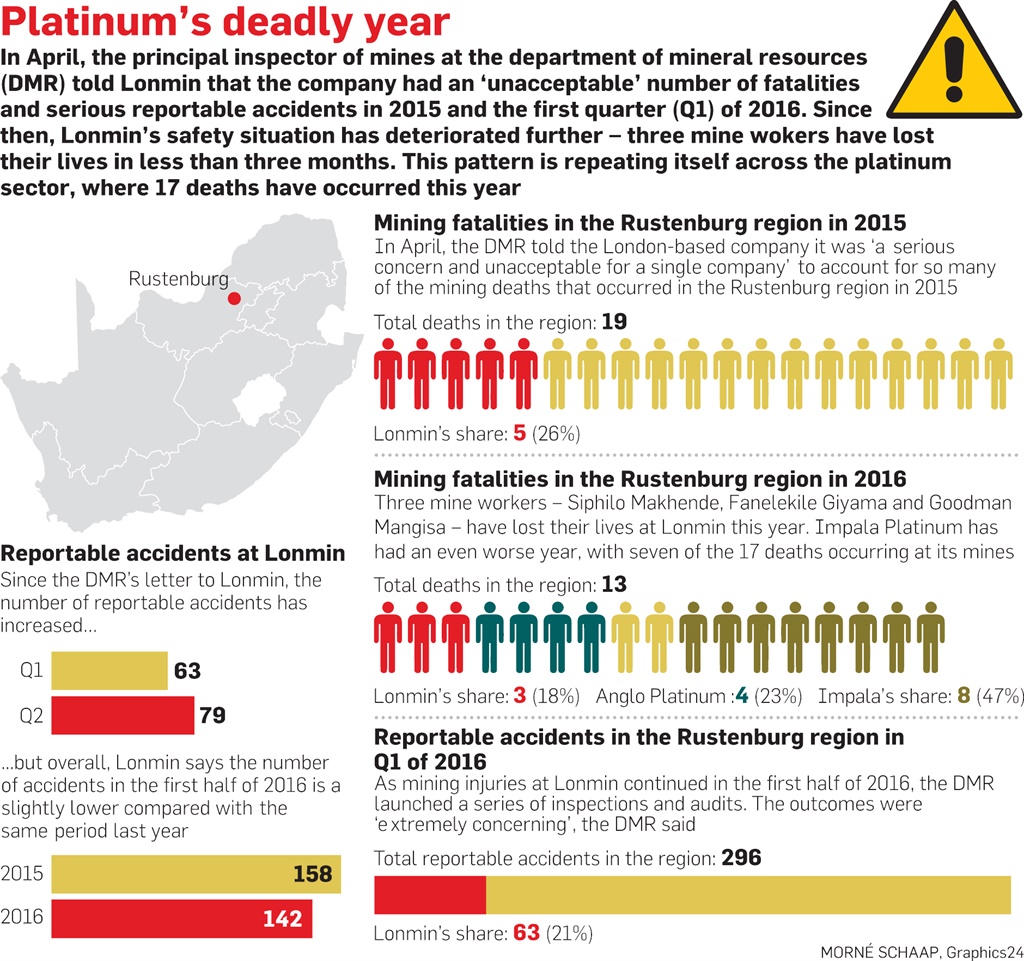
With 49 mine workers having died on the job already this year, government has expressed concern about the industry’s spiralling death toll, saying “extraordinary measures” are needed.
The numbers reflect a drastic increase from the 77 who lost their lives on duty during the whole of last year.
Mineral Resources Minister Mosebenzi Zwane is now sounding alarm bells that if something drastic is not done, 2016 will leave a bloody record.
“This is a serious setback for the sector, which recorded its lowest fatalities in 2015. We should not place value on profits over the lives of workers,” Zwane told mine workers at Sibanye Gold’s Driefontein shaft in Carletonville, west of Johannesburg, two weeks ago.
Sibanye, which recorded the gold sector’s best safety numbers last year, has accounted for 10 of this year’s 49 deaths.
“For the past couple of years, we have been on a positive trend. It is very difficult to say [why that has changed],” said Sibanye spokesperson James Wellsted.
“We try to reverse-engineer every accident and put in place remedial measures, but a lot of the time it is [because of] noncompliance by employees and management – people trying to take short cuts.”
This year’s worst performance has been in North West on Rustenburg’s platinum belt, where 17 mine workers have died so far, compared with 2015’s total of 19 fatalities.
Two weeks ago, Joseph Mathunjwa, president of the Association of Mineworkers and Construction Union (Amcu), addressed mine workers at Lonmin’s Rowland shaft.
“On Saturdays, when we are supposed to be attending weddings, we attend funerals for those who lost their lives in the mining industry,” he said.
“You must understand that our fathers spilt their blood for these mines to be where they are today. Equally, if we are not careful to adhere to safety precautions, our blood will be spilt for them to continue to be profitable into the future.”
Mathunjwa’s words were echoed by Monageng Mothiba, principal inspector of mines in North West.
City Press has seen confidential correspondence between Mothiba and Lonmin in which the mineral resources department inspector said a series of audits by his office found “serious noncompliance and dangerous conditions” at Lonmin’s operations.
“Do not impress your supervisor with your life,” Mothiba told the thousands of mine workers who gathered as part of a safety day, which was ordered by the mineral resources department.
“Always remember you have representatives who are very strong, who can represent you whenever anybody intimidates you when you refuse to access those [unsafe] working places.”
Several Lonmin mine workers, who spoke to City Press on condition of anonymity, said they were pressured to reach production targets, or face disciplinary charges or risk losing their jobs.
“It is difficult to reach our targets. Sometimes we do not have materials, but we have to do it because our supervisors need production,” said one at Rowland shaft.
“If you do not blast, they are going to charge you,” a second mine worker said.
“If you say, ‘No, I am not going to drill it because that place is not alright’, you get charged ... They say you don’t want to work ... If you have objected three times, you’re gone.”
Mathunjwa offered to personally represent mine workers facing disciplinary action for refusing to work in unsafe conditions.
“I am not a president who does not understand the processes of the Commission for Conciliation, Mediation and Arbitration ... I will represent my members if I have to.”
Trade union Solidarity, which represents 1 000 Lonmin employees, said threats of disciplinary action were common across the mining sector.
“It is a catch-22 situation for the employees,” said the union’s head of occupational health and safety, Paul Mardon.
“If they try to exercise their right to withdraw from unsafe workplaces, they are threatened with disciplinary action and dismissal. But also, lately, mines have been taking disciplinary action against them for contravening section 23 [in which their rights are enshrined], if they go into a workplace that they know is unsafe. So they just keep quiet and go in and do the work.”
Mardon said mass retrenchments in the sector were adding to the pressure.
“The pressure to reach production targets is huge. At the same time, the mines have been retrenching people and giving notices of retrenchments. So they really want to reach those production targets.”
Eric Gcilitshana, national secretary for safety and health at the National Union of Mineworkers (NUM), added that in Lonmin’s case, retrenchment-related pressure followed its need to show investors it could deliver on its turnaround strategy and meet targets.
“The company had to borrow money and is under pressure to deliver and repay investors,” he said.
‘Extremely concerning’
“It has been a very bad year for us in terms of the number of fatalities,” said Implats’ Johan Theron.
“From an Impala perspective, we’ve got 13 shafts in Rustenburg. We have not had any fatal accidents at 11 of them.”
The worst tragedy occurred in January, when four mine workers died due to smoke inhalation when a fire broke out at Implats’ shaft 14.
“These are not new accidents,” Gcilitshana said.
“Companies must make sure they share best practices with each other.”
Until April, Lonmin had not recorded any deaths. But confidential letters sent by Mothiba to Lonmin’s London-based board in early April provide insight into the department of mineral resource’s growing concerns.
In 2015, Mothiba wrote, Lonmin accounted for 26% of the region’s fatalities – and, in the first quarter of 2016, for 22% of reported accidents.
“It is a serious concern, and unacceptable for a single company to account for such a figure,” Mothiba wrote to Lonmin chairperson Brian Beamish.
“Following the above, my office conducted a series of inspections and audits ... The outcome was extremely concerning. A total of four section 54 and one section 55 statutory instructions were issued with serious noncompliance and dangerous conditions,” he wrote.
“We have engaged with CEO Ben Magara on several occasions. However, my office feels that it is important that you be invited to intervene, to assist [him] in dealing with some of the ongoing health and safety challenges. Your intervention is urgently required.”
Five days after the letter was sent, rock drill operator Goodman Mangisa was killed in a ground fall incident at Lonmin’s E3 shaft.
Since then, the safety situation deteriorated. On May 7, locomotive operator Fanelekile Giyama was killed at Rowland shaft; and on July 3, rock drill operator Siphilo Makhende died from injuries sustained at E3 shaft.
Lonmin spokesperson Sue Vey downplayed Mothiba’s letter as a “routine letter the mineral resources department sends” to mining companies, adding that within days of receiving it, Magara met Mothiba “for a detailed discussion on safety issues”.
“Mr Mothiba then wrote to Mr Beamish stating that, as a result of that meeting, there was no need for Mr Beamish to respond further,” Vey said in an email.
She added that Lonmin’s share of fatalities and reported incidents should be seen in the context of the company accounting for between 20% and 30% of the province’s platinum production.
“For further context, be aware that the safety performance of our industry in North West deteriorated following the January to June 2014 strike. You would see that this occurred at all three companies involved,” Vey said.
City Press has since seen a second letter Mothiba sent to Lonmin after Makhende’s death.
“The office is well aware of the different strategies that are in place to stop the occurrence of accidents on the mines. From the inspections conducted, it appears that these strategies are not implemented,” Mothiba wrote.
He also instructed Lonmin to hold a safety day, when Magara could personally address employees on safety.
Lonmin was not singled out. Implats confirmed it received a similar letter from Mothiba this month.
‘The bonus is killing us’
On July 13, formal wage negotiations between Lonmin and majority union Amcu officially began, with the union again asking for a R12 500 basic minimum wage – the same demand it made in 2012 at Marikana mine.
This was a central demand back then, and resulted in a strike during which 46 mine workers were killed.
Currently, mine workers earn less but supplement their income through production bonuses of up to R5 000 extra a month.
“It is the bonus that’s killing us,” the second mine worker said. “Right now, we are fighting to get ... the bonus. We do not check if it’s wrong. Everyone needs the bonus, so we do not care about safety.
“If you want to do safety, you are not going to finish two months working there; they are going to chase you [out]. Our management is only looking for production; we are only looking for bonuses.”
The NUM’s Gcilitshana agreed: “The bonus system encourages workers to take short cuts.”
Magara, who addressed staff at Lonmin’s safety day, strongly denied that the mantra at Lonmin had become “production at all costs”.
“Our incentives are safety, production and costs, so it is not just production,” Magara told City Press.
“What happens is, when you have an LTFR [lost time frequency rate], R1 000 is gone. When you have another LTFR, another R1 000 is gone. So you end up losing the production bonus because of safety. So it is extremely intertwined to make sure the mind-set is right.”
Solidarity’s Mardon said: “It is a debate we’ve been having for years: how to find a just and equitable incentive scheme for workers. If you pay people a health and safety bonus, they do not report the incidents.”
Mine workers City Press spoke to said simple things such as Lonmin’s mandatory 10am safety break were frequently ignored.
“Mine procedure says you have to work until 10am, then hold a safety break. But we do not do that; we work through to get our production up,” the first mine worker said.
“At the same time, I can’t blame management, but they are not very strict – if someone is doing something wrong, they do not discipline or fine that person.”
Mardon said Solidarity saw the same pattern at other mines: “We find in platinum and in gold mines that basic things, such as making a workspace safe before entering it [are not done]. After blasting ... the roof bolts are not put in to standard [requirements]; they are wider apart than they should be ... There are poor safety procedures. One of the general problems is lack of proper supervision.”
The mineral resources department declined to comment on Mothiba’s letters, saying they were “confidential”, but it confirmed the chief inspector of mines was investigating Makhende’s death, and compiling its annual report into Lonmin’s safety situation, which will be presented to the minister.
Lonmin said it was introducing new safety procedures, including training programmes for supervisors, compliance audits on contractors and strata controls to prevent fall-of-ground accidents.
Mathunjwa also called on Lonmin to change its overtime policy, even though this would cut into his constituents’ pockets.
“I request of Mr Magara that those shafts with a high number of accidents stop the overtime until the safety is in a good state.”
Lonmin did not indicate whether it would heed Mathunjwa’s call, but Magara appealed to employees to work differently: “I take it personally when we do not work safely. I take it personally when somebody dies ... We say at Lonmin that we dig to improve our lives. We dig to improve our communities – it means we do not dig to injure people; we do not dig to kill people.”
TALK TO US
How should mine safety be enforced? Do you agree with Amcu head Joseph Mathunjwa that production bonus payments should be stopped?
SMS us on 35697 using the keyword MINE. Please include your name and province. SMSes cost R1.50




 Publications
Publications
 Partners
Partners









